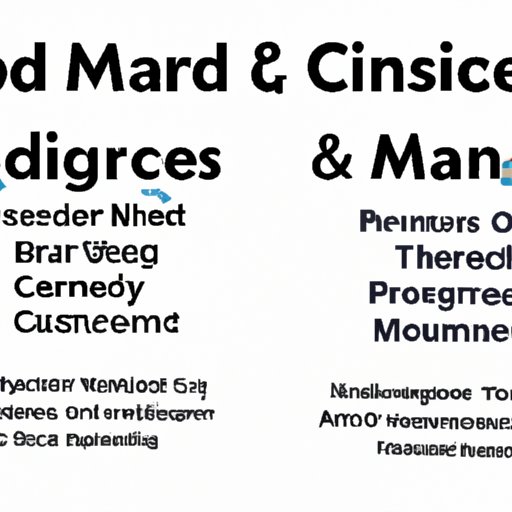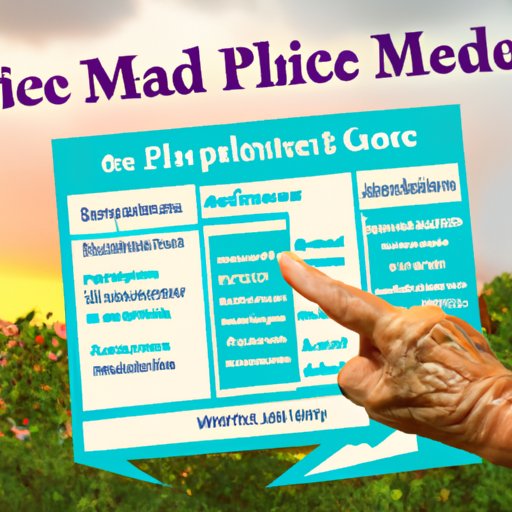Introduction
Managed Medicare is a type of health insurance plan that provides an alternative to traditional Medicare. It’s designed to help patients save money on their healthcare expenses while also offering access to quality care. This guide will explain what managed Medicare is, how it works, and the benefits it offers. We’ll also provide tips on how to find the right plan for you and resources to help you navigate managed Medicare.

Explaining Managed Medicare: What It Is and How It Works
Managed Medicare is a type of health insurance plan offered by private insurers. It’s designed to provide an alternative to traditional Medicare, which is the government-run health insurance program for seniors and people with disabilities. Managed Medicare plans are available through Medicare Advantage (MA) plans or Medicare Part D prescription drug plans.
The different types of managed Medicare plans include: HMOs (Health Maintenance Organizations), PPOs (Preferred Provider Organizations), PSOs (Private Fee-for-Service Plans), and MSA Plans (Medical Savings Accounts). Each type of plan has its own set of rules and regulations, so it’s important to understand the differences between them before selecting a plan.
How does managed Medicare work? Generally, managed Medicare plans require enrollees to choose a primary care physician (PCP) from a network of approved providers. The PCP is responsible for managing the patient’s care and referring them to specialists if needed. In some cases, enrollees may need to obtain prior authorization from the plan before receiving certain services. Additionally, managed Medicare plans may have restrictions on what medications they cover, as well as limits on the number of visits allowed to certain specialists.

Comparing Traditional Medicare vs. Managed Medicare
When deciding between traditional Medicare and managed Medicare, it’s important to understand the differences in coverage and costs. Traditional Medicare consists of Part A (hospital insurance) and Part B (medical insurance). Part A covers hospital stays, skilled nursing facilities, hospice care, and home health services. Part B covers medical services such as doctor visits, lab tests, and preventive care. It also covers some durable medical equipment.
Managed Medicare plans typically offer additional coverage beyond what traditional Medicare provides. This can include vision, hearing, and dental coverage as well as prescription drug coverage. Additionally, managed Medicare plans often have lower out-of-pocket costs than traditional Medicare. However, managed Medicare plans usually limit enrollees to a network of approved providers, whereas traditional Medicare allows enrollees to seek care from any provider that accepts Medicare.

A Guide to Finding the Right Managed Medicare Plan for You
When shopping for a managed Medicare plan, it’s important to assess your needs and find a plan that best meets them. Start by considering your budget, coverage needs, preferred providers, and any special requirements you may have. Then, compare plans side-by-side to determine which one is most suitable for you. Be sure to read the fine print and ask questions if something isn’t clear.
It’s also important to understand the coverage provided by your selected plan. Make sure you’re aware of any deductibles, copayments, coinsurance, and other out-of-pocket costs associated with the plan. Additionally, check to see if there are any limits or restrictions on the drugs or services covered by the plan.
Understanding the Benefits of Managed Medicare
Managed Medicare plans offer many benefits to enrollees. One of the biggest advantages is lower out-of-pocket costs. Since managed Medicare plans often offer additional coverage beyond what traditional Medicare provides, enrollees may be able to save money on their healthcare expenses. Additionally, managed Medicare plans often include cost-sharing features such as copayments and coinsurance, which can help reduce the amount of money the enrollee has to pay out-of-pocket.
Managed Medicare plans also offer improved quality of care. This is because managed Medicare plans usually require enrollees to select a primary care physician from a network of approved providers. The PCP is then responsible for coordinating the patient’s care and referring them to specialists when necessary. Additionally, managed Medicare plans may offer access to specialized providers such as chiropractors, acupuncturists, and physical therapists.
Navigating Managed Medicare: Tips and Resources for Patients
Navigating managed Medicare can be challenging, but there are resources available to help. It’s important to do your research and stay informed about changes to your plan. Additionally, Medicare provides a variety of resources to help enrollees understand their coverage and make informed decisions about their healthcare. These resources include helpful tools such as the Medicare Plan Finder and the Medicare & You Handbook.
It’s also important to keep track of your coverage and regularly review your plan to ensure it still meets your needs. Staying informed and taking advantage of available resources can help you make the most of your managed Medicare plan.
Conclusion
Managed Medicare plans provide an alternative to traditional Medicare. They offer lower out-of-pocket costs, improved quality of care, and access to specialized providers. There are several types of managed Medicare plans available, so it’s important to assess your needs and shop around for the plan that’s right for you. With the right plan in place, you can enjoy the benefits of managed Medicare.
(Note: Is this article not meeting your expectations? Do you have knowledge or insights to share? Unlock new opportunities and expand your reach by joining our authors team. Click Registration to join us and share your expertise with our readers.)
